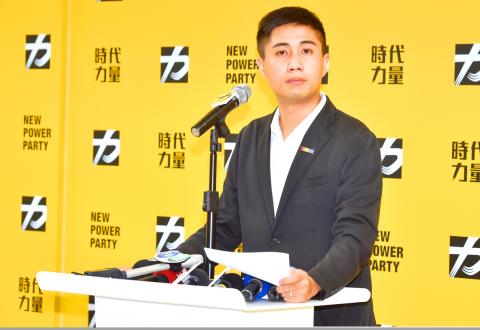The New Power Party (NPP) yesterday said it would transfer an alleged conflict of interest case involving NPP Legislator Kawlo Iyun Pacidal to the Legislative Yuan’s Discipline Committee for investigation following accusations that she abused her power to obtain government subsidies totaling NT$4 million (US$128,721).
The Green Party Taiwan on Monday said that two non-governmental organizations run by Kawlo’s assistant had received NT$4 million in subsidies from the Ministry of Economic Affairs.
The two groups — the Taiwan Association for Indigenous Peoples and Taiwan Associations for Startups and Marketing Centers — were among 19 organizations that in January received ministry subsidies to establish “clean” energy facilities.

Photo: Tu Chien-jung, Taipei Times
Both groups were established by the former director of Kawlo’s office, Chen Shih-chang (陳士章), and are currently managed by her office assistant, Chen En-tse (陳恩澤), the Green Party said on Facebook.
Despite having no former achievements, the two groups each received the maximum subsidy of NT$2 million, it said.
As Kawlo is a member of the Legislative Yuan’s Economics Committee, which is responsible for supervising the ministry, the Green Party accused her assistant of breaching the Act on Recusal of Public Servants Due to Conflicts of Interest (公職人員利益衝突迴避法) by applying for the ministry program.
Article 14 of the act bans public servants and people closely related to them from receiving subsidies from or engaging in monetary transactions with government agencies or organizations under their supervision, it said.
In cases involving an open bidding process, the act requires the bidding public servant, or people related to them, to disclose their identity or connection to the public servant to avoid a conflict of interest, it said.
“When the applicant is a legislator’s office assistant, would the ministry dare give them anything less than the maximum amount? The key question is whether Kawlo exerted pressure on the ministry,” the Green Party said.
Kawlo on Monday denied abusing her power to obtain any subsidies, saying: “The untrue accusations have undermined the reputation of the NPP and myself.”
The subsidies were applied “according to law,” as the act’s provision requiring bidders to disclose their connection to public servants had not yet gone into effect when he applied, Chen En-tse said in a statement yesterday.
The ministry’s Bureau of Energy confirmed that Chen had applied for the subsidies without disclosing his connection to the legislator, and that he applied months before the provisions came into effect in December last year.
The ministry would consult with the Ministry of Justice to determine whether the amendment should apply to the case, it added.
The NPP found evidence that Kawlo’s assistant applied for the subsidy and that Kawlo breached provisions regarding conflict of interest in the Legislators’ Conduct Act (立法委員行為法), the NPP said yesterday after an internal disciplinary meeting.
The committee was unable to reach Kawlo, but told her to offer an explanation on the case by 5pm today, it said, adding that if she does not give an explanation by then, the committee would make a decision without consulting her.
If Kawlo is found to have contravened the law, “in the most severe case, the NPP would require her to resign as legislator and would remove her from the NPP’s decisionmaking committee,” party spokesman Lee Chao-li (李兆立) said.

The Ministry of Economic Affairs has fined Taobao NT$1.2 million (US$36,912) for advertisements that exceed its approved business scope, requiring the Chinese e-commerce platform to make corrections in the first half of this year or its license may be revoked. Lawmakers have called for stricter enforcement of Chinese e-commerce platforms and measures to prevent China from laundering its goods through Taiwan in response to US President Donald Trump’s heavy tariffs on China. The Legislative Yuan’s Finance Committee met today to discuss policies to prevent China from dumping goods in Taiwan, inviting government agencies to report. Democratic Progressive Party Legislator Kuo Kuo-wen (郭國文) said

The Ministry of Economic Affairs has fined Taobao NT$1.2 million (US$36,900) for advertisements that exceeded its approved business scope and ordered the Chinese e-commerce platform to make corrections in the first half of this year or its license would be revoked. Lawmakers have called for stricter supervision of Chinese e-commerce platforms and more stringent measures to prevent China from laundering its goods through Taiwan as US President Donald Trump’s administration cracks down on origin laundering. The legislature’s Finance Committee yesterday met to discuss policies to prevent China from dumping goods in Taiwan, inviting government agencies to report on the matter. Democratic Progressive Party

Taiwan and its Pacific ally Tuvalu on Tuesday signed two accords aimed at facilitating bilateral cooperation on labor affairs, according to Taiwan’s Ministry of Foreign Affairs (MOFA). The governments inked two agreements in Taipei, witnessed by Foreign Minister Lin Chia-lung (林佳龍) and visiting Deputy Tuvaluan Prime Minister Panapasi Nelesone, MOFA said in a news release. According to MOFA, the agreements will facilitate cooperation on labor issues and allow the two sides to mutually recognize seafarers’ certificates and related training. Taiwan would also continue to collaborate with Tuvalu across various fields to promote economic prosperity as well as the well-being of their

Sung Chien-liang (宋建樑), who led efforts to recall Democratic Progressive Party (DPP) Legislator Lee Kun-cheng (李坤城), was released on bail of NT$80,000 today amid outcry over his decision to wear a Nazi armband to questioning the night before. Sung arrived at the New Taipei District Prosecutors’ Office for questioning in a recall petition forgery case last night wearing a red armband bearing a swastika, carrying a copy of Adolf Hitler’s Mein Kampf and giving a Nazi salute. Sung left the building at 1:15am without the armband and covering the book with his coat. Lee said today that this is a serious